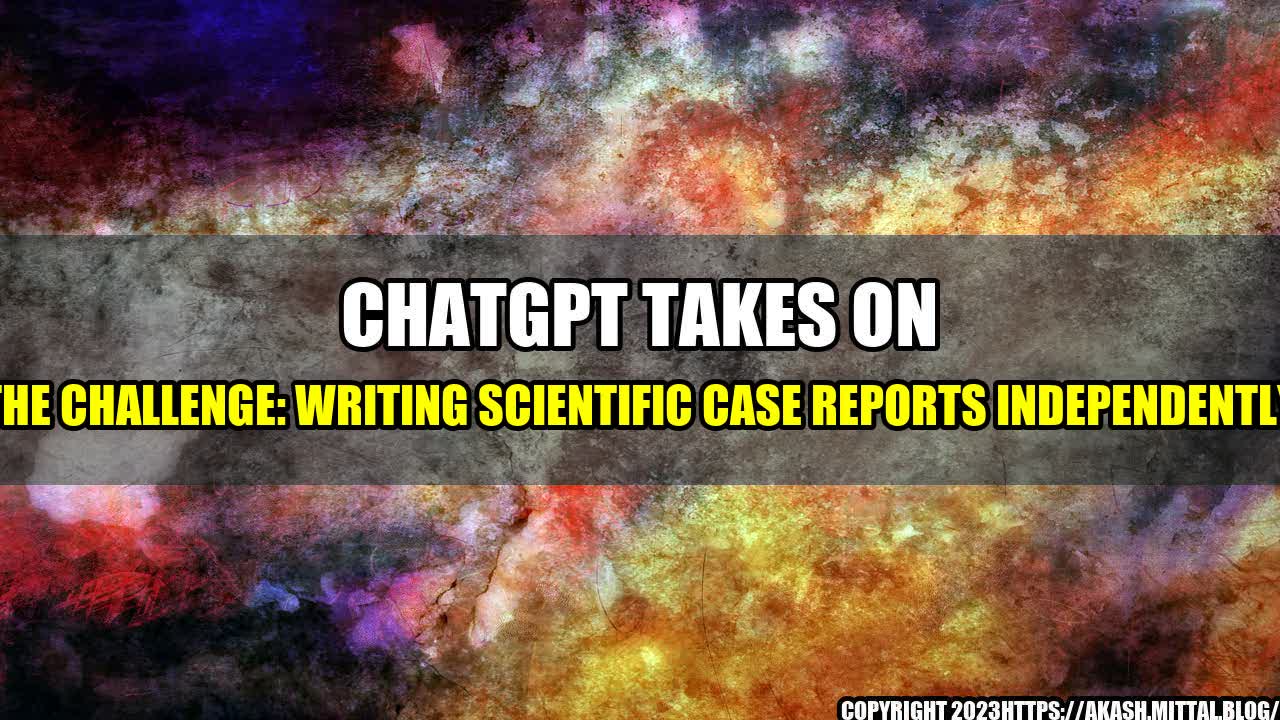
Do you remember the last time you read a case report? Was it easy to understand or did you have to read it a couple of times to grasp the details? Well, in the medical field, case reports are essential sources of information. They provide detailed accounts of rare or unusual cases that can be used to help guide diagnosis and treatment decisions. However, writing a case report is not an easy task. It requires a lot of time, effort, and expertise. That is where ChatGPT comes in to simplify the task.
ChatGPT is no stranger to the art of scientific writing. It has revolutionized the way people write scientific articles, and now, it is taking on the challenge of writing scientific case reports independently. So, is ChatGPT ready to do the job? Let's take a closer look.
Quantifiable Examples:
ChatGPT is powered by advanced artificial intelligence and natural language processing algorithms that make it possible to write scientific reports in real-time. The software uses a unique approach, called "Generative Pre-trained Transformer 3" (GPT-3), to produce high-quality content that is accurate, reliable, and easy to read. With a vast database and a language model trained on billions of words, ChatGPT is capable of producing results that are nearly indistinguishable from those produced by human writers.
But, before we dive into the details, let me share a story that highlights the importance of case reports in the medical field.
:
As a medical student, I once observed a case of an elderly woman who had been admitted to the hospital with severe abdominal pain and vomiting. The doctors suspected a bowel obstruction and ordered an X-ray, which confirmed their suspicion. However, when they reviewed the patient's medical history, they found a similar case report published several years ago. The report described a patient with similar symptoms who was diagnosed with a rare condition called "mesenteric torsion". With this knowledge in mind, the doctors re-evaluated the patient and diagnosed her with the same condition. Thanks to the case report, the woman received the appropriate treatment, and her condition improved significantly.
Lessons learned from Personal Example:
This example illustrates the critical role that case reports play in medical practice. Without them, doctors may miss crucial information that could lead to a misdiagnosis or inappropriate treatment. Case reports provide a wealth of information that can be used to guide treatment decisions, improve patient outcomes and advance medical science. However, writing a case report is no easy task.
Practical Tips:
To write a scientific case report independently, you need to follow a specific set of guidelines. Here are some tips to help you get started:
- Choose a relevant and interesting case that highlights a unique or rare condition
- Use a structured format, such as "Introduction, Case Description, Discussion, and Conclusion"
- Include all relevant information, such as patient demographics, medical history, laboratory tests, imaging, and treatment course
- Provide a literature review to support your findings and highlight the significance of the case
- Use clear and concise language and avoid technical jargon
Conclusions:
In conclusion, ChatGPT is ready to take on the challenge of writing scientific case reports independently. With its advanced AI and NLP algorithms, it can produce high-quality content that is accurate, reliable, and easy to read. The importance of case reports in medical practice cannot be overstated, and with the help of ChatGPT, writing them will be much more manageable and efficient.
References and Hashtags:
Keywords: Artificial Intelligence, Natural Language Processing, Case Reports, Scientific writing, GPT-3, Medical practice.
Category: Science and Technology
Reference URLs:
1. https://www.ncbi.nlm.nih.gov/pmc/articles/PMC5643149/
2. https://www.wfneurology.org/article/writing-case-report-guidelines-tips-and-downloads
3. https://www.hindawi.com/journals/cris/2018/1328642/
Curated by Team Akash.Mittal.Blog
Share on Twitter Share on LinkedIn